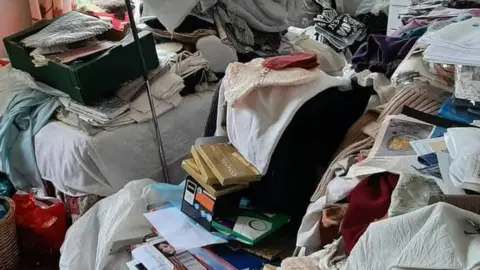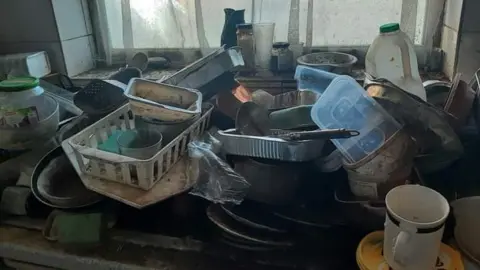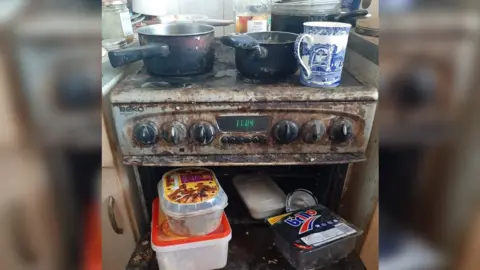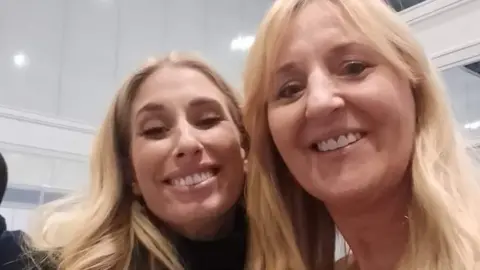Gloucestershire hoarders turn to professionals for support
 Helen Price
Helen PriceThe family of a woman living in a "dangerous environment" said they have turned to professionals to help her with her hoarding habits.
The woman in her 80s, from Gloucestershire, who asked not to disclose her real name, got worse after her Parkinson's progressed.
The hoarding escalated after her husband passed away.
Her daughter-in-law said seeking support has "lifted the emotional burden" on the rest of the family.
Ms K, who also asked not to disclose her real name, has been helping her mother-in-law with her hoarding behaviours for several years.
"You can often find trauma relates to hoarding," she said.
 Helen Price
Helen PriceHoarding is now an acknowledged mental health condition and there is real concern for safety in homes where the fire risk is greatly increased.
Behaviours can typically include keeping or collecting items that have little to no monetary value.
Gloucestershire County Council is offering support to people across the county who have hoarding and chronic disorganisation behaviours.
Ms K said her elderly mother-in-law's behaviour got a lot worse due to the passing of her husband and the progression of her Parkinson's Disease.
"She was living in a very dangerous environment," said Ms K, who moved her mother-in-law in with her when her own house became unsafe.
"We went and we tried to help her trim it down. Everything was very precious and it was very hard for her to let go of stuff.
"Unfortunately, her Parkinson's has advanced to where she is no longer aware of her surroundings."
 Helen Price
Helen PriceMs K is receiving support from Helen Price, who trained with Hoarding Disorders UK to support people with hoarding behaviours.
"Hoarding disorder itself is usually caused by some kind of past trauma, whether that be loss, financial problems, depression, any kind of bad experience," said Ms Price.
"They tend to make a nest for themselves to live in and protect themselves."
Ms Price helps her clients to "uncover the layers" of their home, slowly changing the atmosphere of a house to make it "positive and more relaxing".
 Helen Price
Helen PriceBut she said it is best for family members to try not to get too involved in tidying their loved ones home, as it can sometimes cause issues.
Ms K said: "Having someone else to be part of that journey just stops you being overwhelmed.
"[People with hoarding behaviours] are not doing it completely on purpose. It's not within their control.
"So having someone to deal with the hard stuff has been a real godsend."

What is hoarding?
- According to the NHS, hoarding is a disorder where someone acquires an excessive number of items and stores them in a chaotic manner, usually resulting in unmanageable amounts of clutter
- Hoarding is considered a significant problem if the amount of clutter interferes with everyday living. For example, the person is unable to use their kitchen or bathroom and cannot access rooms
- It is also defined if the clutter is causing significant distress or negatively affecting the quality of life of the person or their family

Michael Clapham, 84, lives with his son in Stroud. He said he has a house about three miles away which is "filled" with all of his stuff.
"I think I am a hoarder because I have lots of things," he said.
He added that he is "responsible" for some hoarding at his son's house and recognises that he needs to sort out his belongings.
"There's no way I am going to throw them away without sorting through them," he said.
"My wife died earlier this year and we both knew we were hoarders. We've got a lot of stuff with great memories."
 Gloucestershire County Council
Gloucestershire County CouncilCouncillor Stephen Fifield, cabinet member responsible for Adult Social Care Delivery for Gloucestershire County Council, said family and friends can suffer through the effects of hoarding.
"Many people who are suffering with hoarding won't know they are. It's normally the family member or friend who points it out first," said Mr Fifield.
The council have launched monthly drop-in sessions to help individuals with these tendencies and offer a holistic approach to supporting them.
They are working in partnership with the six district and borough councils of Gloucestershire, as well as the fire service and Hoarding UK to deliver these sessions.
'Not a lifestyle choice'
Cirencester based hoarding expert Paul Cooper works in people's homes and trains fire services, housing associations, police and NHS all throughout the UK.
"It's not a lifestyle choice, it's a mental health disorder," he said.
Mr Cooper said people with hoarding behaviours often need some sort of therapeutic help, and that symptoms can be difficult to treat without mental health support.
"There are always triggers. The loss of a job, the loss of a marriage, a loss of a person and then you fill that space, that void, with stuff. It's like a comfort blanket."
Currently, the monthly support sessions are on offer in Cheltenham and Gloucester, with plans to expand to the Cotswolds, Forest of Dean, Stroud and Tewkesbury in the coming months.

Follow BBC West on Facebook, X and Instagram. Send your story ideas to: [email protected]
